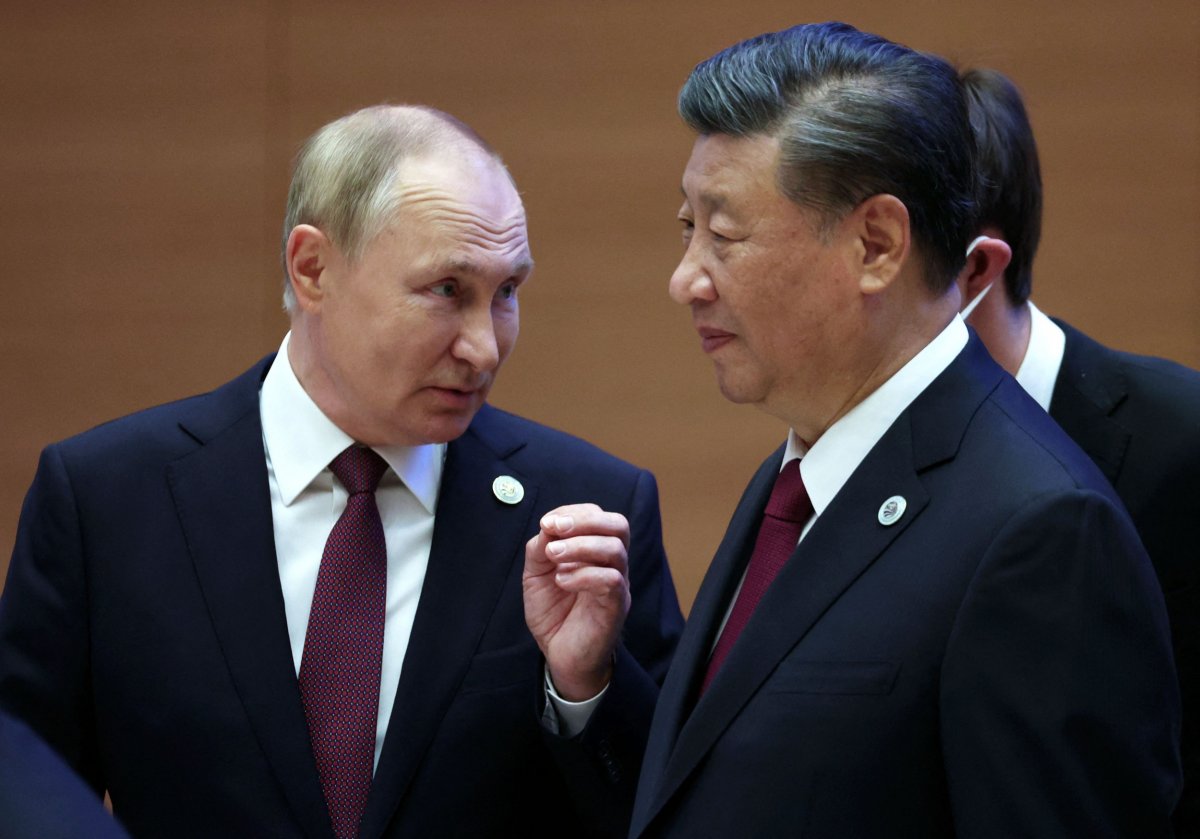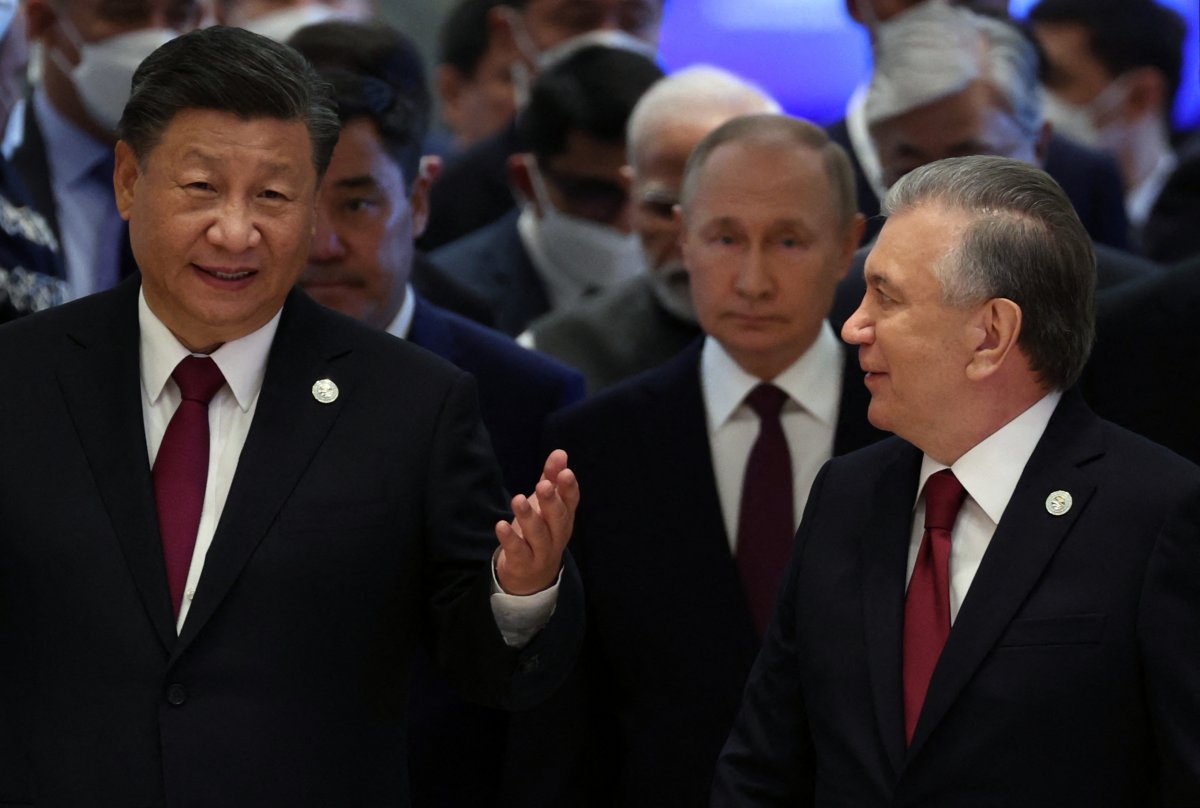Vladimir Putin's seven-month war in Ukraine may have tested the boundaries of his strategic partnership with Xi Jinping, but China's leader is unlikely to desert his Russian counterpart any time soon, despite what some in the West may believe.
Beijing so far has tolerated everything from the Kremlin's blocking of grain exports in the Black Sea to its escalation by partial mobilization and casual nuclear threats. It also is unlikely to interfere with Putin's annexation of pro-Russian regions in eastern and southern Ukraine, support for which would certainly undermine China's own territorial claims.
Indeed, Beijing has been loath to openly endorse Putin's view of self-determination, favoring instead its long-held principle of territorial integrity, directed primarily at Taiwan.
When Putin and Xi met in Samarkand earlier in September for a high-level gathering of the Shanghai Cooperation Organization, the Russian president, reading off note cards, alluded to the Chinese leader's "questions and concerns" about the war in Ukraine.
Some, particularly in the West, thought they were seeing the first signs of a rift and that what little remained of Putin's international backing was falling away. But others believed the vague exchange may have been overinterpreted, to China's benefit.

Whether the Chinese leadership actually offers more support behind closed doors than in public is up for debate.
Before the two presidents reunited in Uzbekistan, Beijing dispatched No. 3 official Li Zhanshu to Vladivostok for a meeting with Putin, and then to Moscow to sit with senior members of the State Duma, Russia's lower house of parliament.
At the latter, Li delivered what amounted to China's clearest, unvarnished solidarity with Russia's cause since the war began, including his view of the United States and NATO as having threatened "the lives of Russian citizens" by "expanding directly on Russia's doorstep."
"I believe Russia was cornered. In this case, to protect the core interests of the country, Russia gave a resolute response," Li told the Russian lawmakers. "China understands, and we are coordinating on various aspects."
The seemingly contradictory messages—happening just one week apart—may have been the result of a quid pro quo that Putin, who also backed China's claim to Taiwan, was in no position to refuse, suggested Brussels-based analyst Theresa Fallon.
Putin's apparent admission of Chinese concerns may have benefited Beijing's "international optics," she told Newsweek.
"Perhaps China wanted to put a little sliver of sunlight between themselves and Russia after the impressive Ukrainian offensive," said Fallon, who is the director of the Center for Russia Europe Asia Studies think tank.

Russia is the only major quasi-ally China can count on in its systemic rivalry with the West in general and the United States in particular. In June, Fallon was among dozens of experts who told a Foreign Affairs survey—with high confidence—that Beijing's tandem with Moscow would last.
"They are still going to stay with Russia. They need to keep them in the tent. They cannot alienate Putin," Fallon said. "They can get more accomplished together than apart," she argued—and Beijing won't mind the growing asymmetry in the balance of hard power either.
"A much weaker Russia is to China's benefit. It's more dependent and gives Beijing more leverage in extracting gains in the Arctic, on energy prices, commodities and technology," she said.
Russia's historical clout in Central Asia has helped China get a solid foot in the door in a region linked to its national security and energy stability. Now, with a heavily sanctioned Russia resigned to junior status in its otherwise "no limits" partnership with China, Beijing may see an avenue to advance its strategic interests westward.
Before meeting Putin and other Shanghai Cooperation Organisation (SCO) leaders in Samarkand, Xi made a state visit to Kazakhstan, his first foreign trip since the COVID-19 pandemic began.
In talks with President Kassym-Jomart Tokayev, Xi said China "firmly supports Kazakhstan in safeguarding national independence, sovereignty and territorial integrity." He then declared: "China will always be a trustworthy and reliable friend and partner of Kazakhstan."
"Xi's reassurances to Kazakhstan on helping them protect their sovereignty were a coded message to Putin," said Fallon. "Beijing is stepping on Moscow's toes in Central Asia," where ex-Soviet republics remain wary of Russia's expansionist ambitions.
"Putin's loss may be Xi's gain in a region where Beijing perceives economic integration as key to their own security. China is slowly, slowly, slowly, eroding Russia's influence in the region," she said.
This scenario was likely to play out even more clearly as Putin doubles down on the conflict, said Fallon. "As Russia focuses its military might in Ukraine, it creates a potential vacuum in Central Asia that China can exploit."
It's unclear why Putin chose to publicly air Xi's concerns—if that's indeed what the seasoned statesman was doing—but Wendy Sherman, the U.S. deputy secretary of state, said last week it showed that Beijing-Moscow ties were "a relationship of convenience" rather than "a full-blown marriage."
She, too, predicted Beijing would be looking to exploit openings in Central Asia. "I'm sure that Xi Jinping is looking for advantage," Sherman said.
Uncommon Knowledge
Newsweek is committed to challenging conventional wisdom and finding connections in the search for common ground.
Newsweek is committed to challenging conventional wisdom and finding connections in the search for common ground.
About the writer
John Feng is Newsweek's contributing editor for Asia based in Taichung, Taiwan. His focus is on East Asian politics. He ... Read more
To read how Newsweek uses AI as a newsroom tool, Click here.








